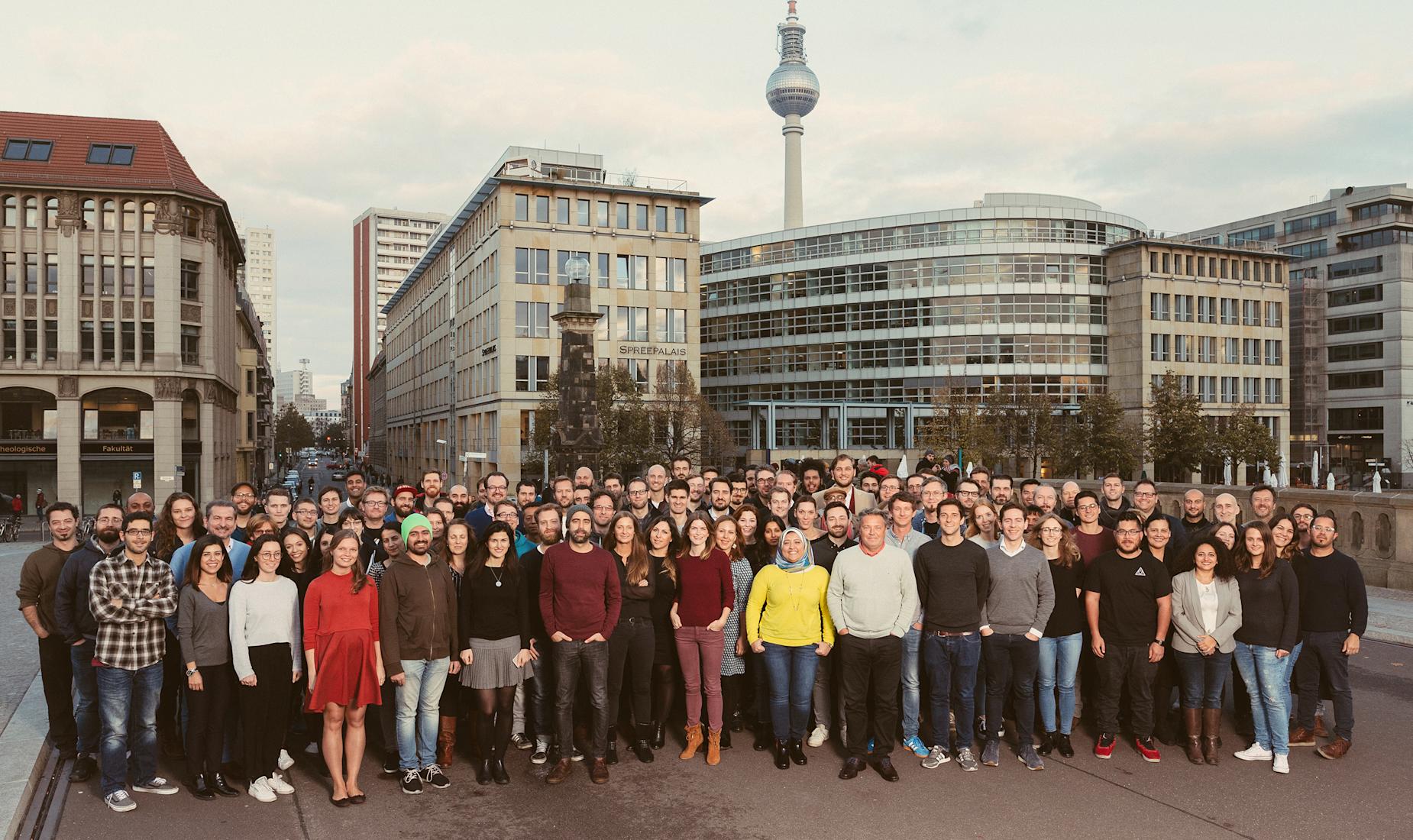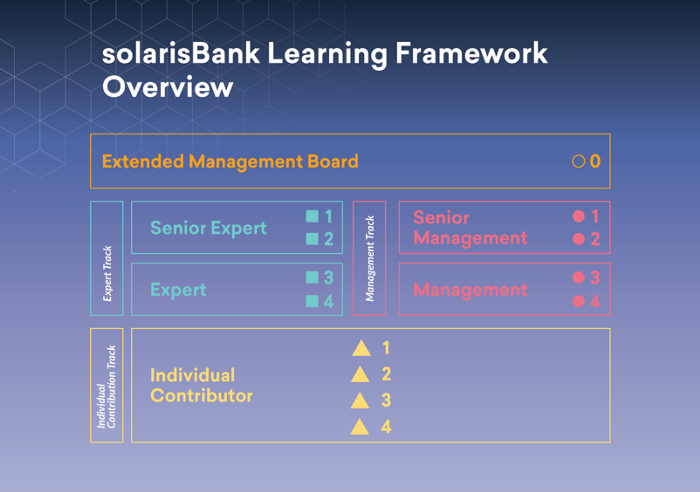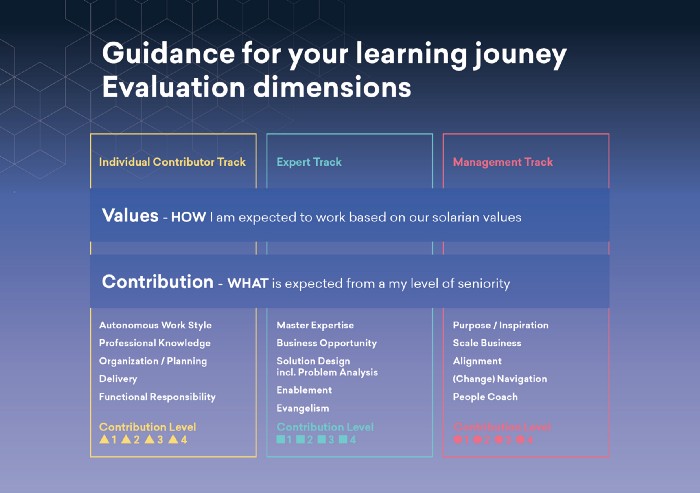The Learning Framework - enabling Solarians to shape their careers
4 minute read


In our more than two years of operation, solarisBank has grown in many ways: the range of products, number of partners and of course also number of employees. As of August 2018, more than 180 solarians work at our offices in Berlin.
Working in the fast-paced environment of fintech, many solarians possess strong ambition and an inherent motivation to develop their careers. It is important to us as an organization to encourage their personal growth and purpose, as this is the main driver of employee engagement as well as meeting their mentality of “going the extra mile”. That is why we, being still in a developmental stage as a company, already put the focus on the professional development of all solarians: by setting-up our Learning Framework. We want for all solarians, to have clarity on their roles, their responsibilities and their professional development. This way, we enable a company culture of shared responsibility when it comes to driving personal and professional development as well as careers.
Why a Learning Framework?
solarisBank prides itself on being a leading driver in the financial services industry and helping other organizations to develop innovative financial products. But how does this translate internally? When solarisBank started — as is typical of many startups — most solarians were working on diversified positions in small teams that shared a variety of responsibilities.
As a result, we lacked a common understanding what development at solarisBank actually means. There was a limited overview within the company of the talents working with us and their corresponding capabilities, and how that is connected to business continuity. Having no clarity on this, we were also lacking a proper basis to appreciate and give feedback to one another. This, amongst other things, also included the risk of establishing a one-sided and old-fashioned understanding of development, appreciation and growth.
So, as we hired more talents, our People & Organization team recognized the stated caveats of this structure and brainstormed ways to improve.
The Learning Framework approach explained
To begin the process, we had some background research to do to put our organizational and cultural principles onto paper. In this process we identified and phrased our company values that describe what is important to us as a company when it comes to interacting and collaborating with one another (you can check them out here). Further, we elaborated key consistencies amongst our employees, understanding that many solarians have a strong drive to not only extend their field of responsibilities, but also accelerate their personal and professional development.
Based on the basic guiding principles to development above, we were able to start the grading exercise. For that we used a tool called gradar and a participative approach. We included the whole leadership team into the process right from the beginning. During the grading process, the different career tracks evolved organically based on the collected feedback from all participants.
Since the grading happened individually for every team, some solarians came together to calibrate the results. Comparing different functions for jobs that are similar to each other, helped to harmonize the whole structure.

Introduction to the three tracks:
As you can see we have three tracks with four levels each. You see forms, colors and numbers, but you don’t see titles. We didn’t want to discuss around titles anymore, but rather focus on a “real” development discussion and what people can learn in a young and growing company like solarisBank. What really matters for your CV is not a title that is hardly comparable within solarisBank, or even with the world outside: it is about what you have achieved and how you contributed to the company’s success. This can be displayed on the three tracks briefly explained in the following:
Individual Contributor Track: Focus on individual contribution to the company, to drive the respective team and scope of work forwards and professionalize.
Expert Track: Focus on mastering a discipline and contributing with this knowledge. Can also have a small team.
Management Track: Focus on leadership and giving purpose through bigger leadership approaches or topics that may impact the company as a whole.

The evaluation that we base our feedback on happens firstly on the values and secondly on the contribution dimensions that are explained with behavioral anchors per level (not explained in depth in this post). As we believe the challenges differ between the tracks, we decided for different contribution dimensions per track in order to facilitate individualized learning journeys. However, we also believe that the main mission on the individual contributor track is to work more autonomously over time, whereas mastering expertise is the focus on the expert track and giving purpose/inspiration the main challenge on the management track.
Where we are today?
After having everything in place and the training of our leads done, we kicked off the framework in April this year. As a next step, leads matched people and positions in order to have a proper basis for the development dialogue which will happen from now onwards compulsory once a year (and additionally as often as needed or requested). People & Organization supports with consultancy and guidelines to prepare the dialogues as well as to foster the reflection on all sides. The individual development will be enriched with other perspectives through structured 360 degree feedbacks. For the compensational part of one’s development, we initiated a Salary & Promotion Committees in order to make informed, fair and objectified decisions. It also helps to highlight individual accomplishments to the Management Board and to strengthen the exchange on development opportunities. This committee will take place twice a year.
As a final note: the tools we have used to outline the Learning Framework aim to provide solarisBank employees with a clear path to personal development, and we are excited to see how everyone’s goals and projects progress over time. However, this model is not set in stone. Any modifications might require us to have rolling iterations of the Framework over the next months.
What are your thoughts on personal development tools in organizations? What works well in your organization and what did you think is especially helpful for your employees — or for you as employee?

